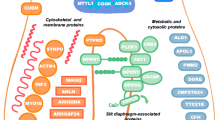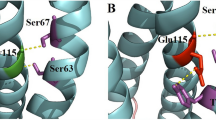Abstract
Renal hypouricemia is a rare heterogeneous inherited disorder characterized by impaired tubular uric acid transport with severe complications, such as acute kidney injury. Type 1 and 2 are caused by loss-of-function mutations in the SLC22A12 and SLC2A9 gene, respectively. A cohort of 881 randomly chosen ethnic Roma from two regions in Eastern Slovakia and two regions in the Czech Republic participated. Genomic DNA was isolated from buccal swabs and/or from blood samples. The c.1245_1253del and c.1400C>T genotypes were determined using polymerase chain reaction with allele-specific primers in a multiplex arrangement and/or direct sequencing of exon 7 and 9. Allele frequencies and genotypes were tested for Hardy–Weinberg equilibrium using the Chi-square test. 25 subjects were heterozygous and three were homozygous for the c.1245_1253del, while 92 subjects were heterozygous and two were homozygous for the c.1400C>T. Moreover, two participants were compound heterozygotes. Frequencies of the c.1245_1253del and c.1400C>T variants were 1.87 and 5.56 %, respectively. Our finding confirms an uneven geographical and ethnic distribution of SLC22A12 mutant variants. We found that the c.1245_1253del and c.1400C>T variants were present in the Czech and Slovak Roma population at unexpectedly high frequencies. Renal hypouricemia should be kept in mind during differential diagnostic on Roma patients with low serum uric acid concentrations.


Similar content being viewed by others
References
Enomoto A, Kimura H, Chairoungdua A, Shigeta Y, Jutabha P, Cha SH, Hosoyamada M, Takeda M, Sekine T, Igarashi T, Matsuo H, Kikuchi Y, Oda T, Ichida K, Hosoya T, Shimokata K, Niwa T, Kanai Y, Endou H (2002) Molecular identification of a renal urate anion exchanger that regulates blood urate levels. Nature 417:447–452
Bhasin B, Stiburkova B, De Castro-Pretelt M, Beck N, Bodurtha JN, Atta MG (2014) Hereditary renal hypouricemia: a new role for allopurinol? Am J Med 127:e3–e4
Iwai N, Mino Y, Hosoyamada M, Tago N, Kokubo Y, Endou H (2004) A high prevalence of renal hypouricemia caused by inactive SLC22A12 in Japanese. Kidney Int 66:935–944
Sebesta I, Stiburkova B, Bartl J, Ichida K, Hosoyamada M, Taylor J, Marinaki A (2011) Diagnostic tests for primary renal hypouricemia. Nucleosides Nucleotides Nucleic Acids 30:1112–1116
Stiburkova B, Sebesta I, Ichida K, Nakamura M, Hulkova H, Krylov V, Kryspinova L, Jahnova H (2013) Novel allelic variants and evidence for a prevalent mutation in URAT1 causing renal hypouricemia: biochemical, genetics and functional analysis. Eur J Hum Genet 21:1067–1073
Stiburkova B, Stekrova J, Nakamura M, Ichida K (2015) Hereditary Renal Hypouricemia Type 1 and Autosomal Dominant Polycystic Kidney Disease. Am J Med Sci (in press)
Ichida K, Hosoyamada M, Kamatani N, Kamitsuji S, Hisatome I, Shibasaki T, Hosoya T (2008) Age and origin of the G774A mutation in SLC22A12 causing renal hypouricemia in Japanese. Clin Genet 74:243–251
Tabara Y, Kohara K, Kawamoto R, Hiura Y, Nishimura K, Morisaki T, Kokubo Y, Okamura T, Tomoike H, Iwai N, Miki T (2010) Association of four genetic loci with uric acid levels and reduced renal function: the J-SHIPP Suita study. Am J Nephrol 32:279–286
Hamajima N, Naito M, Hishida A, Okada R, Asai Y, Wakai K (2011) Serum uric acid distribution according to SLC22A12 W258X genotype in a cross-sectional study of a general Japanese population. BMC Med Genet 12:33
Tasic V, Hynes AM, Kitamura K, Cheong HI, Lozanovski VJ, Gucev Z, Jutabha P, Anzai N, Sayer JA (2011) Clinical and Functional Characterization of URAT1 Variants. PLoS ONE 6:e28641
Stiburkova B, Taylor J, Marinaki AM, Sebesta I (2012) Acute kidney injury in two children caused by renal hypouricaemia type 2. Pediatr Nephrol 27:1411–1415
Erley CM, Hirschberg RR, Hoefer W, Schaefer K (1989) Acute renal failure due to uric acid nephropathy in a patient with renal hypouricemia. Klin Wochenschr 67:308–312
Ouellet G, Lin SH, Nolin L, Bonnardeaux A (2009) Hereditary renal hypouricemia in a caucasian patient: a case report and review of the literature. Nephrol Ther 5:568–571
Takagi S, Omae R, Makanga JO, Kawahara T, Inazu T (2013) Simple and rapid detection method for the mutations in SLC22A12 that cause hypouricemia by allele-specific real-time polymerase chain reaction. Clin Chim Acta 415:330–333
Ferák V, Siváková D, Sieglová Z (1987) The Slovak gypsies (Romany)–a population with the highest coefficient of inbreeding in Europe. Bratisl Lekárske Listy 87:168–175
Morar B, Gresham D, Angelicheva D, Tournev I, Gooding R, Guergueltcheva V, Schmidt C, Abicht A, Lochmuller H, Tordai A, Kalmar L, Nagy M, Karcagi V, Jeanpierre M, Herczegfalvi A, Beeson D, Venkataraman V, Warwick Carter K, Reeve J, de Pablo R, Kucinskas V, Kalaydjieva L (2004) Mutation history of the Roma/gypsies. Am J Hum Genet 75:596–609
Acknowledgments
The authors thank Dr. Eva Gerhatova from Generi Biotech, Hradec Kralove, Czech Republic for supplying part of Roma cohort. Support: by the SRDA (APVV-0716-10), by the ASFEU (ITMS: 26220120041) and by grants from the Czech Republic: the Ministry of Education, Youth and Sports (LH13245) and the Ministry of Health the project for conceptual development of research organization 00023728 (Institute of Rheumatology).
Conflict of interest
The authors declare no conflict of interest.
Author information
Authors and Affiliations
Corresponding author
Rights and permissions
About this article
Cite this article
Gabrikova, D., Bernasovska, J., Sokolova, J. et al. High frequency of SLC22A12 variants causing renal hypouricemia 1 in the Czech and Slovak Roma population; simple and rapid detection method by allele-specific polymerase chain reaction. Urolithiasis 43, 441–445 (2015). https://doi.org/10.1007/s00240-015-0790-4
Received:
Accepted:
Published:
Issue Date:
DOI: https://doi.org/10.1007/s00240-015-0790-4




